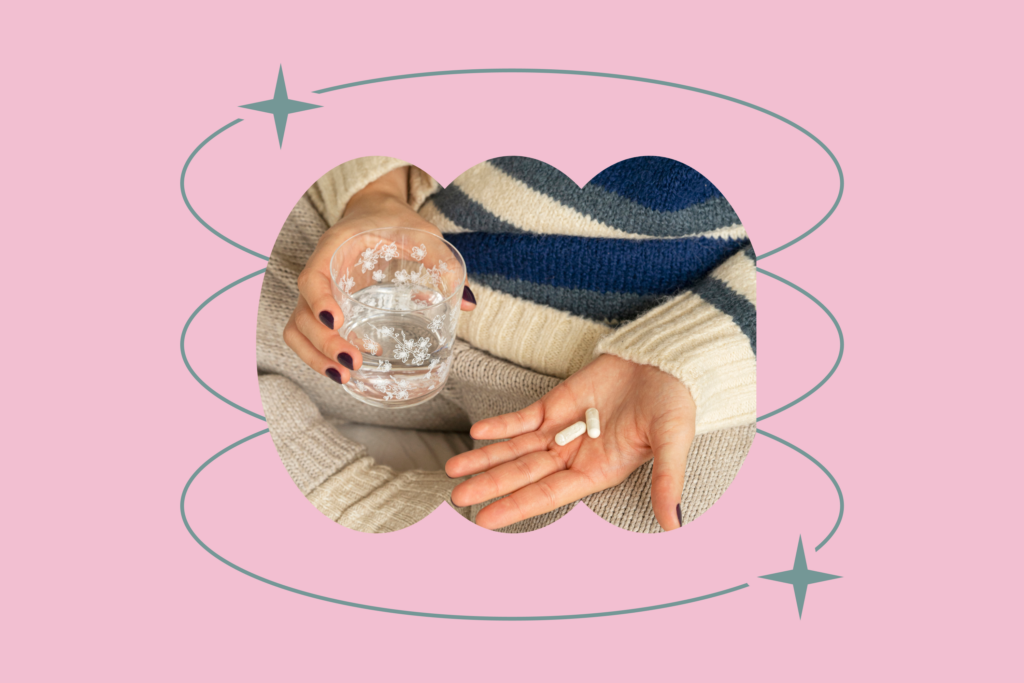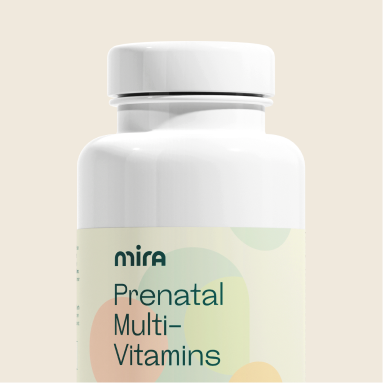Best Fertility Supplements To Help You Get Pregnant

When it comes to getting pregnant it can feel like it’s out of your control, but there are things you can do to help out the cause. Lifestyle choices are a major factor in improving fertility and vitamins and supplements are one area you can certainly take charge. Not only will they prepare your body for pregnancy, but the right combination of supplements and vitamins could even boost your chances of conceiving. We’ve researched the best fertility supplements to get pregnant to help you figure out that combination. Pregnancy doesn’t happen without ovulation though so we’ve also looked at vitamins to help ovulation. After all, one of the best ways to get female fertility help and optimize your chances of getting pregnant is to make sure your body has the building blocks it needs. In this article we’ll cover what each supplement does, the best vitamins to support ovulation, and how they can give your fertility a boost.
Can Supplements Boost Fertility?
Diet and lifestyle are major factors when it comes to your fertility and how successful you will be at getting pregnant. There are many things you can do to boost fertility, like quitting smoking for example, but research has shown that getting the right micronutrients can also influence fertility. After all, your body needs these nutrients to support physiological processes like ovulation, fertilization, and implantation so it makes sense that having adequate levels would have a beneficial effect on fertility.
Traditionally supplementation has focused on its many benefits for preventing birth defects and eating a healthy diet is still the best way to get the nutrients and minerals you need. Although we need bigger and better studies on supplementation, early literature suggests proper supplementation can have a “small but beneficial” effect on fertility, including an increased chance at becoming pregnant and taking less time to do so. It never hurts to take a broad-spectrum multivitamin, but when it comes to fertility you may want a more personalized approach to optimize results.
Choosing the right multivitamins
Choosing a prenatal multivitamin formulated by experts offers several distinct advantages, highlighting the premium quality of vitamins and emphasizing that not all supplements are created equal.
Formulas developed by experts, like the Mira Prenatals ones, typically contain an optimal balance and dosage of vitamins and minerals specifically tailored to meet the unique needs of pregnant women. These formulations are backed by scientific research and clinical expertise, ensuring that essential nutrients are provided in the most effective and bioavailable forms. Also, premium prenatal multivitamins sourced and selected by experts are more likely to use high-quality ingredients that undergo rigorous testing for purity, potency, and safety.
Vitamins that help ovulation
Strictly speaking, the best way to help ovulation is to balance your hormones, maintain a healthy diet, get plenty of sleep, minimize stress levels, and exercise regularly. This will increase your odds of ovulation, but there are certain supplements and vitamins that may also help. Folates, omega-3 fatty acids, and iron have all been associated with ovulatory function.
Folic acid is well known as an essential prenatal vitamin as it helps to reduce risk of neural tube defects. But if you’re trying to get pregnant, it’s a good idea to supplement with this B vitamin for other reasons as well. Although more research is needed, folic acid can potentially help with ovulation. And since many pregnancies are unplanned, or at the very least unexpected, supplementing before you are pregnant helps reduce unnecessary risk of neural tube defects and many healthcare providers suggest it as a crucial vitamin for all women.
Omega-3 fatty acids are good for many aspects of your overall health but in terms of fertility, they can especially help ovulation. An important aspect of ovulation is having balanced hormones and omega-3’s have been shown to help regulate reproductive hormones. By reducing overall inflammation, omega-3s are a powerful supplement for female fertility help. Not only that, some research shows that women who take omega-3’s are 1.5 times more likely to conceive than those that aren’t taking them. With a host of other benefits, supplementing with omega-3 fatty acids can easily be one of the best fertility supplements to help you get pregnant.

Iron is a vital nutrient and impacts your energy as well as fertility. There is a link between iron levels and ovulation since low levels may lead to a lack of ovulation, not to mention the energy level you’ll need to actually get pregnant. But more research is needed on whether supplementing with iron is necessary to help avoid ovulatory issues. Before rushing out to get an iron supplement, it’s best to have your levels checked by your doctor so they can determine if you are low or could use help via supplementation. You’ll need more iron once you become pregnant to help prevent anemia, but unless you are having issues, you may not necessarily need it to become pregnant. That’s why you should have your levels checked so your doctor can determine if you need the boost or not.
General fertility vitamins for women
Vitamins are essential for many functions and play an important role in your health. And when you’re trying to create the right environment for a pregnancy, it’s important that you are getting the right ones at the right levels. The ones listed below are not only beneficial for your overall health, but have a promising role in the ability to get and stay pregnant.
Vitamin E
Vitamin E helps repair cells and is a key nutrient for the ovaries. It’s an essential fat-soluble nutrient and can be found in many foods and supplements and as an antioxidant it helps prevent damage to cells caused by free radicals. Aside from the benefits it provides to the female reproductive system, it’s also found in many male fertility supplements. Vitamin E enhances the efficiency of the male system by promoting sperm function and can be helpful for both men and women to take when trying to get pregnant.
Vitamin D
Not only is vitamin D important for your overall health, but it may also be critical for fertility and pregnancy outcomes. It’s crucial to your endocrine system and also helps regulate the absorption of calcium. Getting enough vitamin D may lower inflammation, improve insulin resistance, and regulate your menstrual cycle. It’s also one of the best fertility supplements for PCOS, a leading underlying cause of infertility.
Fish Oil
Fish oil has a host of health benefits for women including brain and eye development, as well as preventing heart disease and declining mental function. Research has also demonstrated that supplementing with fish oil can help improve ovulation, ovarian reserve, and overall fertility. Fish oil is packed with omega-3s that all cells need to function normally and can be a vital source of fat and energy for the body. Since our bodies don’t naturally produce omega-3s, they must be consumed through diet or supplementation.
Coenzyme Q10 (CoQ10)
CoQ10 is known as a “mitochondrial nutrient” as it supports the mitochondria also known as the powerhouse of the cell. This makes it critical to cellular energy production and can help improve egg quality. Although it’s used for both cell growth and maintenance, it also has antioxidant properties. Natural levels decline as we age and it’s difficult to consume enough via diet which makes this an important supplement to consider, especially if age is a factor. Since natural fertility levels decline as we age, this supplement is key if you are older or have low ovarian reserve. Consider screening your AMH level to check your ovarian reserve (you can even do it with an at-home lab test).
Selenium
Selenium is another antioxidant that helps protect cells from the damage done by free radicals. Research shows a preliminary link between a deficiency in selenium and miscarriage as well as it’s role in promoting healthy follicles in the ovaries.
N-Acetyl Cysteine (NAC)
Another powerful antioxidant, n-acetyl cysteine (NAC) promotes detoxification and can protect eggs from oxidative damage. It also helps increase the quality of cervical mucus which is important for helping sperm get where they need to go and keeping them in an optimal environment for survival.
Zinc
Zinc plays a role in fertilization, DNA regulation, and embryo development. Being deficient in this nutrient may have a negative effect on egg development as well as a host of other reproductive functions. It also helps regulate hormone function and ovulation and is essential for proper functioning of the reproductive system. Since our bodies can’t store zinc, it’s an important supplement for anyone trying to conceive.
Conclusion
Boosting fertility can be a tricky business. Before deciding which supplement is right for you, it’s always best to consult with your physician. They can help you determine what nutrients you need and the best form for you to take them in, not to mention take into account your personal health variables and how supplementation may affect you. Many factors can affect fertility but taking the best fertility supplements to get pregnant should always start with a conversation with your healthcare provider or a fertility coach.

A little extra support from an expert can go a long way
Book an online consultation with one of our Hormone Health Coaches.
Schedule NowIn addition to using fertility supplements, it’s important to consider other things you can do to help you conceive. One of the best things you can do is use a fertility tracker that helps you make sense of your cycle. It’s important to track your cycle and ovulation, especially if you plan to get pregnant at some point. Digital fertility analyzers like Mira track actual hormone concentrations and use smart learning to better understand your specific cycle. The hormone data alone can be extremely useful, regardless of your fertility goals.
Mira’s Editorial Process
All content produced by Mira meets stringent editorial standards, ensuring excellence and accuracy in language and medical precision. Every piece undergoes thorough fact-checking and review by qualified professionals. Check out our full editorial process to learn more.












